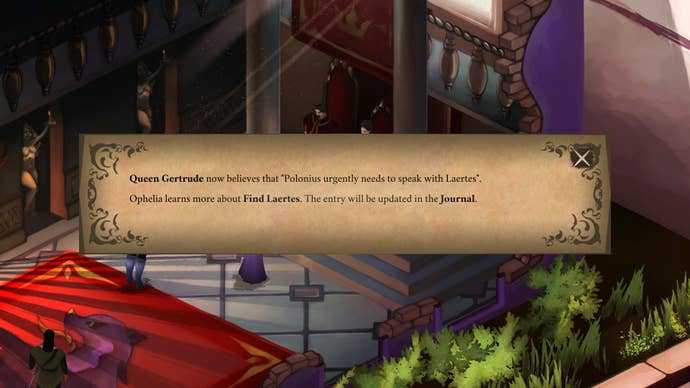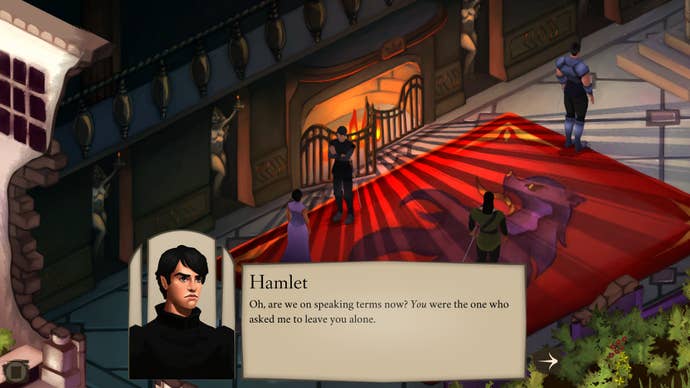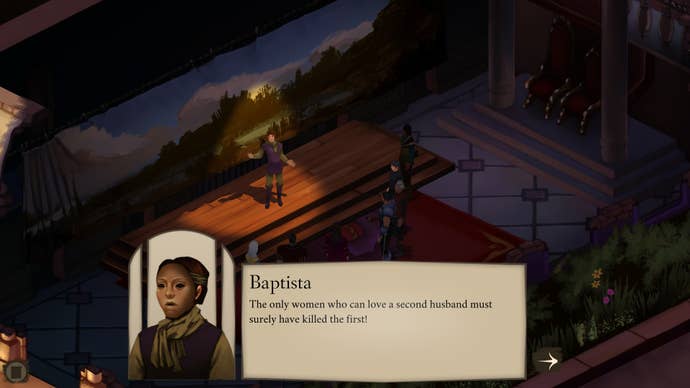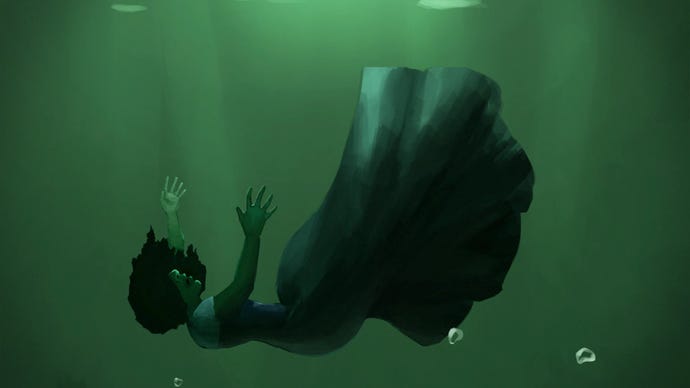Elsinore Review
What a piece of work is a man.
This article first appeared on USgamer, a partner publication of VG247. Some content, such as this article, has been migrated to VG247 for posterity after USgamer's closure - but it has not been edited or further vetted by the VG247 team.
People have a proclivity for drama and ruin, given the right stage. It's easy to wonder why Shakespearean tragedies pan out in certain ways, or wonder why a character would ever do this instead of that. Elsinore calls that bluff. A text-driven adventure game, it places you in the shoes of Ophelia in the midst of Hamlet, trapped in a time-loop. You are given a few threads and pointers, but those who've read the play know what impending doom is coming. Elsinore asks: can you avert it?
The ultimate objective of Elsinore is to stop the loop and, hopefully, find some happy ending. Yet time and time again, I failed. My best-laid plans frequently fell to shreds around me. I caused the death of my brother, father, and the entire royal family. Offhand conversations would ripple throughout the castle, leaving cast members broken and shattered. As Ophelia, I was drowned, stabbed, exiled, and more. I saw the walls of Elsinore fall to an invading army, and I was powerless to help even though I knew it was coming. And when I told people the truth, most thought I was mad.
Elsinore takes the tragedy of Ophelia as an opportunity to develop a compelling narrative of repetition and desperation. It's a compelling take on Hamlet, mostly because Ophelia is the perfect conduit; her madness from the play can be easily hand-waved as a side-effect of seeing these repetitions, over and over again. The first time Polonius dies, Ophelia is heartbroken and inconsolable. By the fifth or sixth time, Ophelia was apathetic, and so was I. "I'll see him again in the next world."
Developer Golden Glitch Studios makes good use of this setup to delve into an intricate game of hypotheticals possible with an omniscient observer inside the walls of Elsinore. And it does a lot, for what is ultimately an adventure game where most of the action takes place in dialogues and cutscenes. Setting up the house of cards and seeing how it falls is very engaging, and like another recent time-loop game Outer Wilds, it makes clever use of journals and other tools to ease the frustration of seeing how your actions affect the present world.
Elsinore plays out in real-time, as actors move around you and go about their daily routines. If you do nothing, you're essentially in the middle of Hamlet, watching it all happen from Ophelia's perspective. Different players run across a world with soft edges and distinct, but unimposing, backgrounds. There's some light music, though it's often the same couple of themes over and over.

The focus is on the characters, and so you spend pretty much all your time talking to them or walking from one area to another, often waiting for events to occur. The writing is fantastic, and easily Elisnore's high point. Through twists and turns, the dialogue adds new phrasing or a modern twist to the story, adapting to each new what-if scenario, while still echoing the original text. Elsinore goes to some very wild, interesting places throughout the six to eight hours it might take you to see a conclusion, but the writing keeps things fresh most of the way. It knows just when to take liberties, though I did sometimes wish for an option to skip dialogue I'd read a dozen times over or so.
In conversations with other characters, you can bring up topics of discussion, from basic inquiries on the state of the castle ("what's up with Hamlet?") to more pressing matters uncovered in your investigation ("King Claudius killed his brother!"). Finding and opening up these matters of inquiry is core to progressing towards the end of Elsinore's time loop.
An early example is the first hurdle the game places in your way, in the form of a spy who stabs Ophelia. As you learn from the bard Quince, a borrowed player from Shakespeare's other work A Midsummer Night's Dream and an eerily knowledgeable figure, this will always end your timeline. For Ophelia to learn more about what's happening, you'll need to uncover the spy.
This sets up the general trial-and-error loop that makes up most of Elsinore. I would stake out suspects, following them around through their daily tasks. I knew that the spy's knife was always coming, and I even found ways of stalling it for a time, but uncovering their identity was critical. Whether Rosie and Gilda (Rosencrantz and Guildenstern, Hamlet's erstwhile school pals), the kitchen maid, the visiting noble, or even a member of the royal court, I didn't rule anything out.

The investigation also helps set up the timeline, one of the most critical parts of Elsinore and its smartest inclusion. Loops are not concise in Elsinore, and can span a long period of time. Once you've set an event in motion, the timeline will update to show when and where this event will likely occur. When searching for my spy, I could send various people to Bernardo for questioning, and the timeline would update to let me know when they would be in the guardhouse so I could listen in. The timeline also notes when certain events won't happen due to a conflicting occurrence, which was helpful if not occasionally frustrating, as I accidentally ruined one lead while trying to pursue another, and had to reset.
Events are also long reaching, extending across the play's potential timeline. While my first few hours were spent exploring every room and minute of Elsinore, tracing the baseline of each character, the following few were spent putting a move in motion and waiting out the result. You can speed up the clock, but even that is a sped-up form of a built-in stalling period. Because various story beats and leads can overwrite each other, sometimes to mutual ruin, it felt frustrating trying to follow more than a single story beat at a time.

While you can eventually overcome certain obstacles, rewriting the "canon" of the play, many events still have to unfold in full. Moving forward means crossing more points off in your journal, learning more information, and trying to see how events could overlap and tiny influences could change the course of history. The original Hamlet ends with everyone dead and Prince Fortinbras of neighboring Norway on the throne, and it never seems like Elsinore can end any better.
This chase can become exhaustive. At one point, I spent an entire timeline pursuing a rather odd romance with King Claudius, after the premature death of Queen Gertrude—which may or may not have been my fault. As I kept going further, the game kept asking if I was sure. At one point, even Ophelia remarks on the events, wondering whether this is something she actually wants to do, or if she's just seeing every possible permutation to its conclusion.
Elsinore is decidedly for the kind of person who wants to see these permutations play out. There's a morbid curiosity that Elsinore feeds for Shakespeare fans. And because of that, it largely appeals to those who enjoy the idea of a time-bending story inside the framework of Hamlet. Learning how to manipulate the inhabitants of Elsinore is half the fun, but it won't appeal to folks who aren't already enamored with tales of Shakespearean tragedy.
ConclusionElsinore is simple and focused, aimed squarely at avid readers who want to manipulate Hamlet with their own hands. It succeeds at this, building a wonderfully meta-textual world that's fascinating to unravel and earns a good few gasps, laughs, and tearful moments, but the long waiting periods and frustration between different events overlapping can grate on after a while. Elsinore is time-looping Hamlet, and that premise is what will likely hook you or not.


